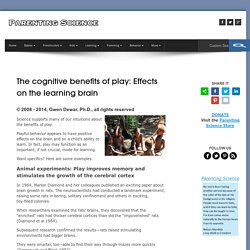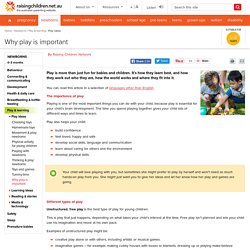

Early Years Workshop. 15 mins Childminder 1 We visit accredited childminder Julie Thomas in Birmingham who looks after a pair of three-year-olds.

Having noticed the children's excitement about buses, Julie builds a bus journey into her plans. No Subtitles 15 mins Childminder 2 Sheila Sage, a primary adviser with responsibility for early years in Worcestershire is joined by a panel of experts to dicuss childminding techniques as seen in the previous programme: Childminder 1. 15 mins Nursery 1 The workshop visits Canterbury Cross Nursery, Handsworth, Birmingham to concentrate on observation and assessment. 15 mins Nursery 2 In this programme, a panel of experts discuss points raised by the previous programme and offer their advice. 15 mins Reception 1 This programme looks at the balance between child-initiated and adult-directed play, by focusing on Berridge Infant School, a multicultural school in Nottingham.
The cognitive benefits of play: Effects on the learning brain. © 2008 - 2014, Gwen Dewar, Ph.D., all rights reserved Science supports many of our intuitions about the benefits of play.

Playful behavior appears to have positive effects on the brain and on a child’s ability to learn. In fact, play may function as an important, if not crucial, mode for learning. Want specifics? Here are some examples. Animal experiments: Play improves memory and stimulates the growth of the cerebral cortex In 1964, Marion Diamond and her colleagues published an exciting paper about brain growth in rats.
When researchers examined the rats’ brains, they discovered that the “enriched" rats had thicker cerebral cortices than did the “impoverished" rats (Diamond et al 1964). Subsequent research confirmed the results—rats raised stimulating environments had bigger brains. They were smarter, too--able to find their way through mazes more quickly (Greenough and Black 1992). Do these benefits of play extend to humans?
How long should recess be? Brains At Play. Symbolic play and language development. Highlights Longitudinal indication for the link between simple symbolic action and symbolic development. Simple symbolic actions link to babbling and complex symbolic outputs. Frequency at initiation of babbling associated with initiation of complex symbolic behaviors. Results support a direct-path hypothesis and an indirect one, rather than a dual-path hypothesis. Mother's responsiveness is related to the production of symbolic play. Abstract Symbolic play and language are known to be highly interrelated, but the developmental process involved in this relationship is not clear.
Keywords. Belonging being and becoming the early years learning framework for australia. Importance of play for babies & children. Play is more than just fun for babies and children.

It’s how they learn best, and how they work out who they are, how the world works and where they fit into it. You can read this article in a selection of languages other than English. The importance of play Playing is one of the most important things you can do with your child, because play is essential for your child’s brain development. The time you spend playing together gives your child lots of different ways and times to learn. Play also helps your child: build confidence feel loved, happy and safe develop social skills, language and communication learn about caring for others and the environment develop physical skills. Your child will love playing with you, but sometimes she might prefer to play by herself and won’t need so much hands-on play from you. Different types play. How young children learn English through play.
As we release Learning Time with Timmy – our first app for early-years learners of English – Danitza Villarroel, a teacher on our Learning Time with Shaun and Timmy course in Chile, explains the importance of learning through play, and offers a few tips for teachers new to this age group. Teaching English to pre-school children can be daunting for teachers new to this age group. Young children have shorter attention spans than older children and adults, and they're still learning their mother tongue. But teaching these learners can be enormously rewarding once you've taken a few basic principles on board. The importance of active learning Active learning means fully involving children in the learning process. Promoting learning through play Play is a very significant part of what life means to children at this stage of their development.
Encouraging children's creativity and imagination It's important that we help young learners develop beyond mere language abilities. ZERO TO THREE.